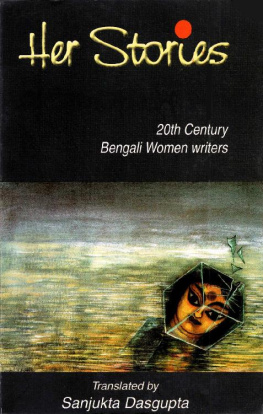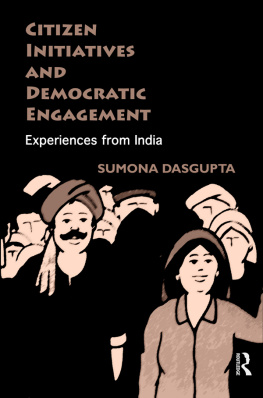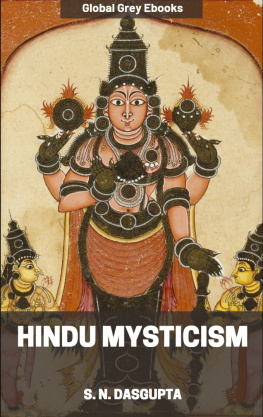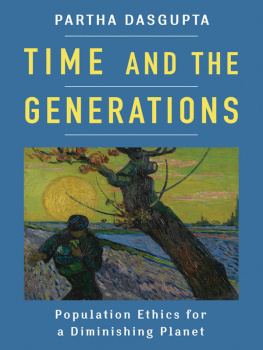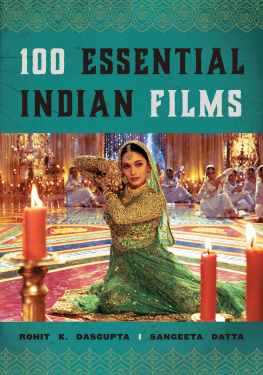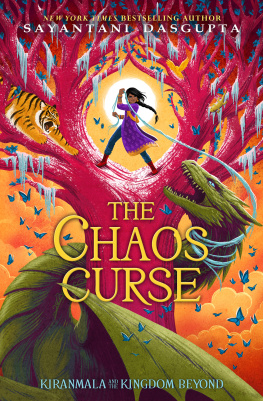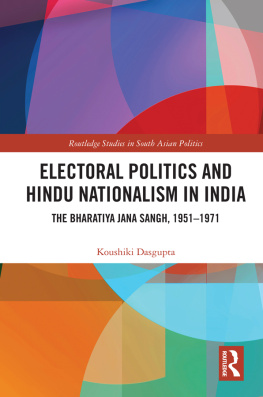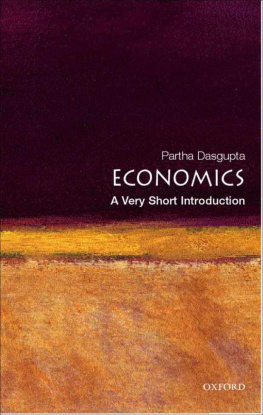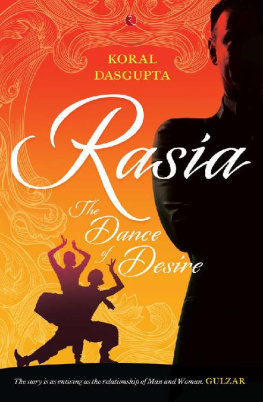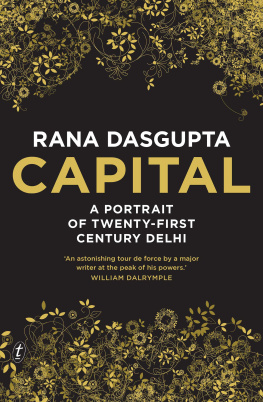Her Stories
th Century
Bengali Women Writers
Translated by
Sanjukta Dasgupta
Srishti
Publishers & Distributors
Srishti Publishers & Distributors
Registered Office : N-16, C.R. Park
New Delhi 110 019
Corporate Office : 212A, Peacock Lane
Shahpur Jat, New Delhi 110 049
First published by
Srishti Publishers & Distributors in 2002
Copyright Srishti Publishers & Distributors in 2002
Copyright for each individual story in its original language is held by the individual authors.
Copyright for the English translation is held Dr. Sanjukta Dasgupta.
Cover design by Vinayak Bhattacharya
Printed and bound in India by
Yugeen Printer, Noida
All rights reserved. No part of this publication may be reproduced, stored in a retrieval system or transmitted in any form or by any means, electronic, mechanical, photocopying, recording or otherwise, without the permission of the publisher.
Contents
:
:
:
:
:
:
:
:
Preface
The journey from powerlessness to empowerment is not about traversing highways, but a search of this flicker of light at the end of a dark tunnel. It is the promise of this flicker that inspired me to take on this task of translation that would enable others thereby to share the light. Many of these selected stories therefore, prioritize the well being rather than the ill being of women in varying degrees, in an ongoing process of negotiation. The stories are about womens resistance to, reconciliation with and rejection of patriarchal ideology. These eight short stories by contemporary Bengali women writers have been arranged according to approximate chronological seniority of the writers. The stories have been selected as representative texts of the twentieth century with Ashapurna Devi as a bridge between the colonial and postcolonial culture in West Bengal followed by three senior writers of short stories Mahasweta Devi, Nabanita Deb Sen and Bani Basu. Interestingly, all four writers were born in colonial India.
The other four writers, Jaya Mitra, Suchitra Bhattacharya, Minakshi Sen and Anita Agnihotri have received wide acclaim for their translation of Bengali values and culture, which have been powerfully documented. All these writers were born in post-independent, postcolonial India. I have tried to select the eight short stories wherein the voice of the women resonates with power even if briefly, or expresses resistance, thereby problematising her gendered identity. All these short stories critique the subject-position of the represented women, sometimes conforming to stereotypes and sometimes deconstructing myths and traditions as singular agents of power. Demystification of womanhood appears to be a common agenda, if one may use such a word, in critiquing a fictional text, of these writers.
Readers of Bangla literature will inevitably be able to cite at least eighty other stories that I could have chosen. No one, other than the selector could be more conscious about the sense of closure that selections generate. The eight short stories included here are all about women by contemporary women writers spanning a period of about fifty years. I have tried to trace through these translated texts the gendered presence and absence, womens identity, subjectivity and agency, the sameness and difference, the silences, the sensitivity, the resistance and the courage in the face of systematic exploitation, oppression and marginalization. Also these texts explore the violence against women, womens victimization, the humiliation suffered by both educated and cultured middle class women with economic security and women from the disadvantaged classes with little or no education and economic freedom. These juxtapositions of class and gender in the decolonized space of independent India graph out disturbing representations of sameness in difference, mapping a wide cross-section of social culture.
I had increasingly felt the need for such a book which would be representative of Bangla womens writing of the twentieth century. The need became a conviction during my stay at the USA as a Fulbright Fellow, where there seemed to be an avid hunger for more translations. In many seminars and conferences in other states of India as well as abroad I have been urged by friends and participants to think of putting together such a book. Meeting Rani Ray editor of Srishti Publisher translated my dream into reality.
Translating these texts in between professional and familial responsibilities took quite a while, including the awareness that computers too could be temperamental. But selecting the title happened without much ado. The title Her Stories not only seemed to be apt but also clearly brought out the two tiered structured of the selection. Each story is not only a creative narrative, but narrates and translates in some ways the creator behind the creation. I have tried to give a voice to the mind that imagines, moulds and welds the artifact, The author who is no longer with us, speaks to us too. But living authors can be coaxed to share with the readers their responses and dreams. All the writers I spoke to expressed an intense eagerness for reader response. It is also a too obvious fact that readers too are curious about the mind that has intrigued, regaled or disturbed them.
Each translated short story is preceded by a bio-critical introduction pertaining to the respective writer. Also, a short interview with the author of the selected story is included. Incidentally, this plan has been appreciated by the writers as they contemporary author would enrich and enhance the long term value of a translated text and make it more reader-friendly I am extremely grateful to the writers for their enthusiastic co-operation and patience and I sincerely feel that this is their book, for the covers enfold their stories and stories by them. As Ashapurna Devi is no longer alive, I interviewed her son Sushanta Gupta and her daughter-in-law, Nupur Gupta who are reliable sources with competence to comment on her writings.
The first story Opium is about the making of the stereotype. The emphasis is on the process of this making. I do not know of too many Ashapurna Devis stories where irony has been utilized with such impact. The title itself underscores that this is indeed a narrative about the narcotic effect of material wealth, affluence, economic power and marital sex. The addictiveness to the sense of security that marriage ensures also outlines that the magic words that sustain the interpersonal, heterosexual relationship are surrender, sacrifice, compromise and adjustment. In her naivet, Sumita tried to withdrawn from the alien environment of her in-laws house, where she seemed to experience repeated culture shocks. But the withdrawal symptoms were too excruciatingly painful. So the letter she wrote to her husband in that reconciliatory tone was like waving the flag of unconditional surrender ..her sense of values were melting away. The irony in the story is further accentuated by the comments of the narrator who would have been happy to end the narrative with Sumitas spirited rebuff and return to her fathers house, but is compelled to record Sumitas sexual and material addiction.
Mahasweta Devis story Chinta is a representation of a different class- the experience of female domestic workers who come from rural to make a living in the city. This arrival to the city was sometimes by choice but more often by circumstantial compulsion that can very form trafficking to abandonment, victimized by seduction, deception and the pangs of poverty. Chinta was a woman with property; she was a widow and mother of a minor son when she arrived in the city, lured by Utsav Errant youth and bodily desires. Who does not marry her and abandons her after they have two daughters. Chintas sexuality lured the male workers in the neighborhood, and though her two very young daughters, like a pair of dressed spring chicken, resembled patients of malnutrition, they had market value as they were after all girl children. So Chinta sold them off, as she was compelled to return to her village home, again to secure property interests for her legal son.


